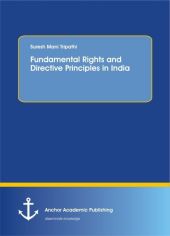 Neuerscheinungen 2016Stand: 2020-02-01 |
Schnellsuche
ISBN/Stichwort/Autor
|
Herderstraße 10
10625 Berlin
Tel.: 030 315 714 16
Fax 030 315 714 14
info@buchspektrum.de |

Suresh Mani Tripathi
Fundamental Rights and Directive Principles in India
2016. 344 S. 220 mm
Verlag/Jahr: ANCHOR ACADEMIC PUBLISHING 2016
ISBN: 3-9606700-3-6 (3960670036)
Neue ISBN: 978-3-9606700-3-2 (9783960670032)
Preis und Lieferzeit: Bitte klicken
The Constitution of India is a social document which contains various aspects of ideas of the Founding Fathers. The preambular promise of socio-economic justice has been incorporated by the Founding Fathers in various provisions of Part 3 and Part 4 of the Constitution which represents the Fundamental Rights and Directive Principles of State Policy respectively.
This book contains the meaning, concept and development of Fundamental Rights and Directive Principles of State Policy. An attempt has been made in this book to present in a systematic manner the Fundamental Rights and Directive Principles of State Policy as embodied in the Constitution of India. The historical aspects of the subject have also been dealt with in a lucid and interesting manner. The changing dimensions of Fundamental Rights and Directive Principles of State Policy have also been dealt with in this book. Every point is explained with the help of new case law and articles of the Constitution.
´Text sample:
Chapter 3: Fundamental Rights, Directive Principles And Fundamental Duties:
A. Fundamentals of the Constitution:
1 The Constitution which lays down the basic structure of a nation´s polity is built on the foundations of certain fundamental values. The vision of our founding fathers and the aims and objectives which they wanted to achieve through the Constitution are contained in the Preamble, the Fundamental Rights and the Directive Principles. These three may be described as the soul of the Constitution and the testament of the founding fathers to the succeeding generations together with the later Part on Fundamental Duties.
B. Vision of Socio-Economic Change:
The Preamble:
2.1 The vision of socio-economic change through the Constitution is reflected in ist lofty Preamble. The Preamble expresses the ideals and aspirations of a renascent India. At independence, emerging out of a long period of foreign domination and oppression under a feudal system, the people were grimly struggling to be reborn into a life of dignity and hope. The past was heavy on their shoulders, and the future uncertain. There was social and economic exploitation around. There were a whole host of social ills such as illiteracy, superstition, sati, child-marriage, agrarian exploitation, child-labour, bonded labour, gender-inequality, bedeviling the society and polity.
2.2 The framers of the Constitution sought to unite the vast country with ist great diversity of languages and creeds within a common bond of constitutional justice based on the great ideals of liberty, equality, fraternity and justice. Framers showed an uncompromising respect for human dignity, an unquestioning commitment to equality and non-discrimination, and an abiding concern for the poor and the weak. They made a bold attempt to base the constitutional foundations on the firm faith that all classes of people, followers of all faiths, and particularly the traditionally under-privileged should all join to work for harmony, progress, prosperity and nation building.
2.3 The Preamble through ist noble words promised Justice, social, economic and political; Liberty of thought, expression, belief, freedom of faith and worship; Equality of status and of opportunity and to promote Fraternity, assuring the dignity of the individual and the unity and integrity of the Nation. Speaking of the imperatives of social democracy, Dr. Ambedkar said:"it was, indeed, a way of life, which recognizes liberty, equality and fraternity as the principles of life and which cannot be divorced from each other: Liberty cannot be divorced from equality; equality cannot be divorced from liberty. Nor can liberty and equality be divorced from fraternity. Without equality, liberty would produce the supremacy of the few over the many. Equality without liberty would kill individual initiative. Without fraternity, liberty and equality could not become a natural course of things".
The Socio-economic Agenda:
3.1 The scheme of the Constitution for the realisation of the socio-economic agenda comprises of both the justiciable Fundamental Rights as well as the non-justiciable Directive Principles. The judicial contribution to the synthesis and the integration of the Fundamental Rights and the Directive Principles in the process of "constitutionalising" social and economic rights has been crucial to the realisation of the Directive Principles not only as a means to effectuate Fundamental Rights but also as a source of laws for a welfare state.
3.2 The Constitution makes it mandatory to protect and promote freedoms, and to assure every citizen a decent standard of living. It makes a strong commitment to promoting the wellbeing of all citizens without any discrimination on the grounds of caste, creed, community or gender.
C. Fundamental Rights:
Background and Approach:
4.1 Constitutional guarantees for the human rights o


